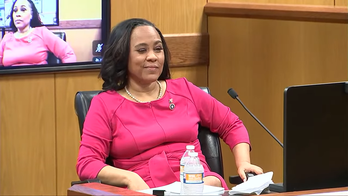Biden makes Sign of the Cross while rallying for abortion access
President Biden made the Sign of the Cross at a campaign rally focused on abortion rights in Tampa, Florida
The contentious issue of abortion has returned to the Supreme Court, with the justices prepared on Wednesday to weigh a states' rights challenge over hospital emergency room access to the procedure.
In nearly two hours of oral arguments, the high court confronted whether state abortion restrictions are invalidated by a federal law.
It was unclear from the public session how the court might eventually decide. The votes of Justices Brett Kavanaugh and Amy Coney Barrett may prove decisive. They asked tough questions of both sides.
Idaho officials say hospitals cannot be forced by the Biden administration to perform abortions in potentially emergency situations – even if the state has a near total ban on the procedure – with an exception only to save the life of the mother.
SCOTUS TO HEAR ARGUMENTS IN BIDEN’S LAWSUIT 'SUBVERTING STATES' RIGHTS' ON ABORTION
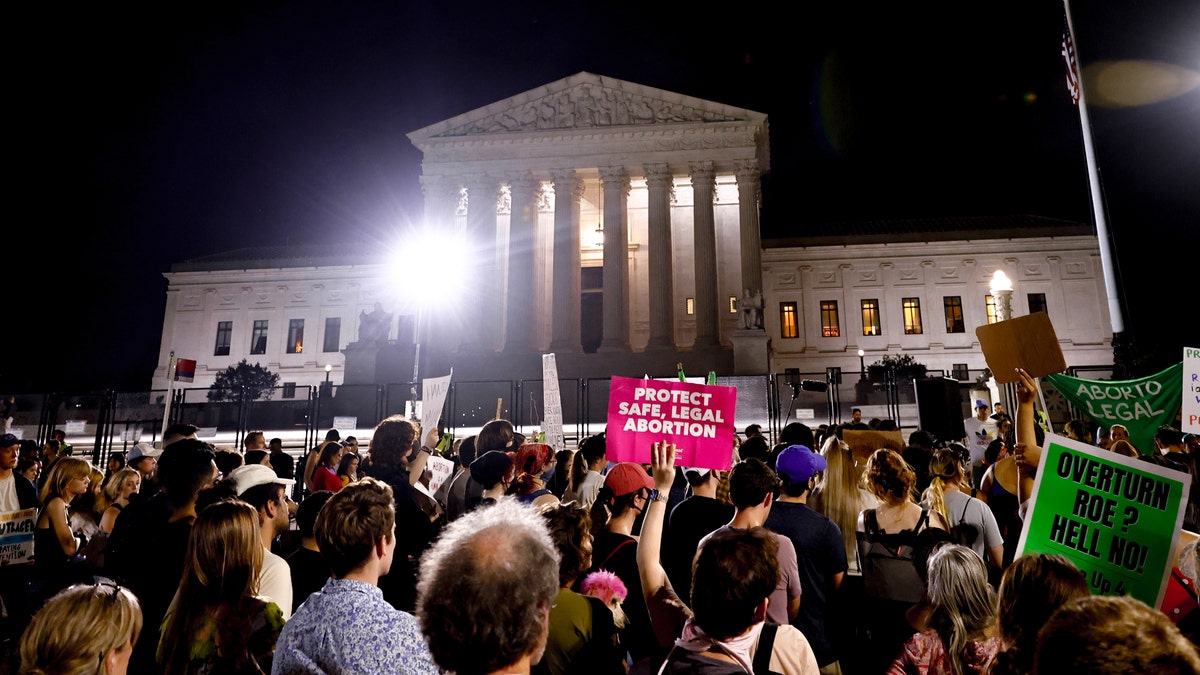
Crowds outside the Supreme Court reacting Roe v. Wade overturned in 2022. (Fox News Photo/Joshua Comins)
The Justice Department argues the federal Emergency Medical Treatment and Labor Act (EMTALA) requires health care providers to give "stabilizing treatment" – including abortions – for patients when needed to treat an emergency medical condition, even if doing so might conflict with a state's abortion restrictions.
In arguments, the court appeared divided along ideological lines, with conservative justices questioning the federal government's authority.
"How can you impose restrictions on what Idaho can criminalize, simply because hospitals in Idaho have chosen to participate in Medicare?" asked Justice Samuel Alito, who was most in questioning U.S. Solicitor General Elizabeth Prelogar.
But the three more liberal justices were equally skeptical of the state's position.
"It's not always the state's way," said Justice Elena Kagan, when it comes to deciding when to defer to a doctor's "good faith judgment" on treating a medical crisis that may not immediately threaten a patient's life.
"Within these rare cases, there's a significant number where the woman's life is not in peril, but she's going to lose her reproductive organs. She's going to lose the ability to have children in the future unless an abortion takes place," said Justice Elena Kagan.
"It can’t be the right standard of care to force somebody onto a helicopter," for out-of-state care, she added. The federal government had called that "patient dumping."
The state can enforce its restrictions until a final ruling.
Hundreds of people gathered outside the court in competing rallies, carrying signs and giving speeches.
The latest debate comes as the court again confronts perhaps the nation's most divisive social issue, with several state voter referendums planned for the November elections over abortion rights. That includes Florida and New York, and possibly in Arizona, Colorado, Missouri, and other states.
The justices held separate arguments last month over nationwide access to the abortion drug mifepristone.
Rulings in both cases could dramatically shape how the issue plays out in the political dialogue this fall.
The current appeal arose after the Biden Justice Department sued Idaho, just two weeks after the Supreme Court's landmark 2022 ruling striking down Roe v. Wade and the nationwide constitutional right to abortion.
In an amicus brief filed with the justices, a group of nearly 700 doctors in Idaho said the state law was putting patients at risk when serious pregnancy complications arise.
WHY TRUMP IS DEFERRING TO THE STATES, AFTER WEIGHING AN ABORTION BAN AT 15 WEEKS
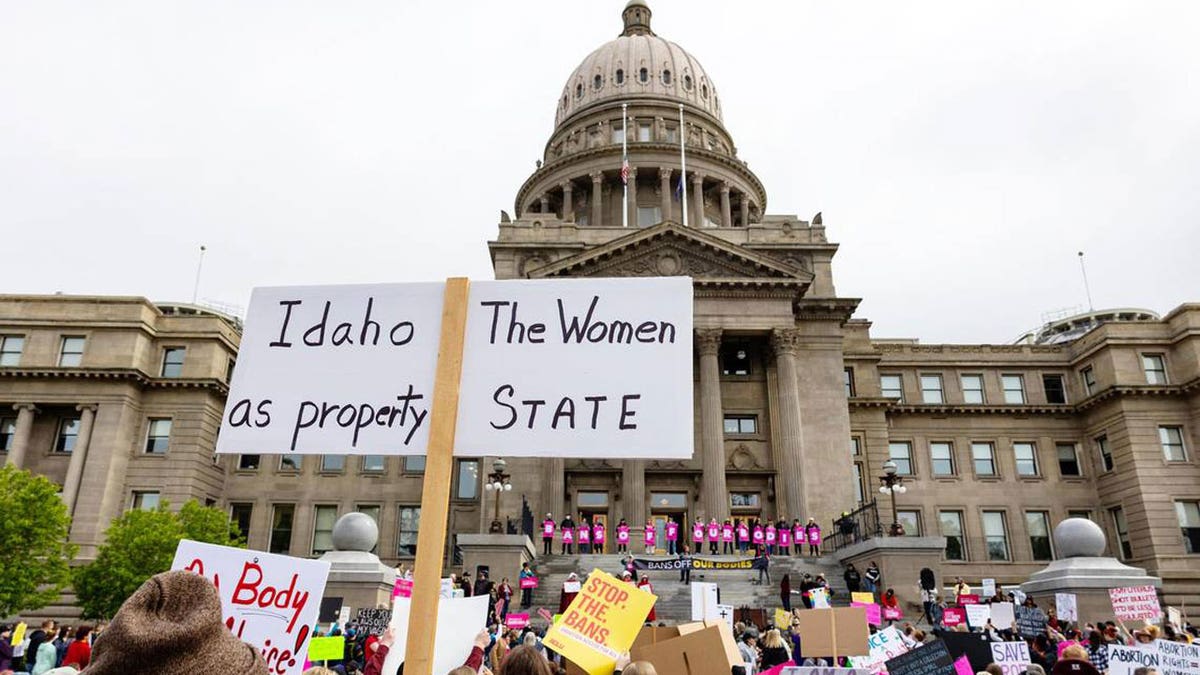
An attendee at an abortion rights rally holds a sign outside the Idaho Capitol on May 14. (Sarah A. Miller/Idaho Statesman/Tribune News Service via Getty Images)
The physicians said an unspecified number of women have either been sent home, forced to find another in-state hospital, or leave the state to get appropriate care, citing one example.
"The risk of infection, sepsis, or other complications is extremely high with a premature rupture of the membranes as early as this one. Another hospital had already turned the patient away — effectively, in petitioner's words, 'dumping' the patient, citing its inability to provide care under Idaho’s total abortion ban."
"This experience was traumatic for the patient and torture for the doctor," said the legal brief. "The doctor both felt she had violated her medical ethics by delaying necessary, standard care, and feared the repercussions from the State if she didn't wait quite long enough."
Abortion rights groups say the broader effect is reduced quality of prenatal care, with some Idaho physicians choosing to practice elsewhere, and hospitals struggling to recruit OB-GYNs.
A group of 258 Democratic members of Congress also filed a brief in support of the federal government.
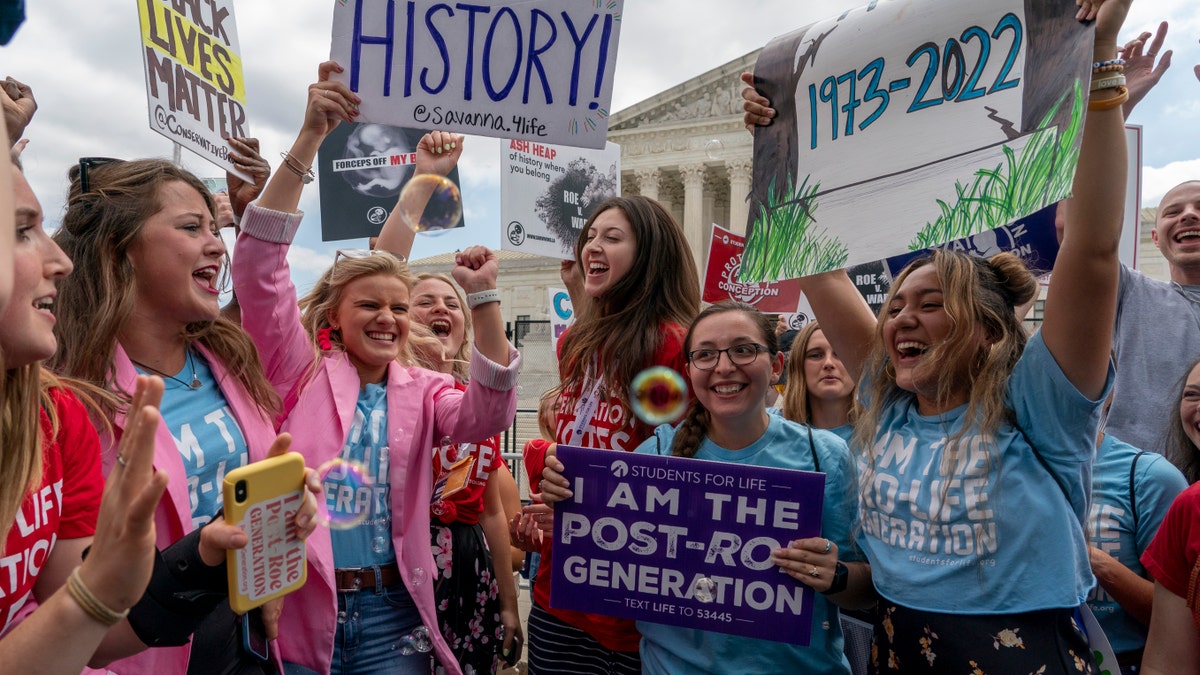
Pro-life women celebrate following the Supreme Court's decision to overturn Roe v. Wade, outside the Supreme Court in Washington, Friday, June 24, 2022. (AP Photo/Gemunu Amarasinghe)
But the state told the high court its ruling two years ago returning abortion matters to the states directly conflicts with the Biden administration's "politically significant" efforts to impose federal law.
"The Biden administration reinterpreted the Emergency Medical Treatment and Active Labor Act (EMTALA) to create a nationwide abortion mandate in hospital emergency rooms that accept Medicare funding. That mandate — discovered nearly 40 years after EMTALA’s enactment — has no support in the statutory text. The mandate was an attempt to reimpose a federal abortion requirement, this time through the exercise of raw executive power."
A group of 22 GOP-controlled states led by Indiana are among those filing amicus briefs supporting Idaho's law.
The courtroom arguments focused on interpreting federal versus state law requirements when it comes to what is an "accepted standard of care," and what constitutes a "medical crisis," when it comes to emergency abortion care.
"The federal mandate is to provide stabilizing care for emergency conditions, regardless of any other directive that the state has or the hospital has," said Justice Ketanji Brown Jackson.
In strongly worded terms, Justice Sonia Sotomayor told the acting Idaho solicitor general Joshua Turner the state law could result in imperiling a woman's life.
"What you are saying is that there is no federal law on the book that prohibits any state from saying even if a woman will die, you can’t perform an abortion," Sotomayor said. "Your theory of this case leads to that conclusion," she added.
Sotomayor added if states could ignore federal law, doctors would be allowed to refuse to treat diabetes with insulin, requiring only pills be used. The justice herself has diabetes.
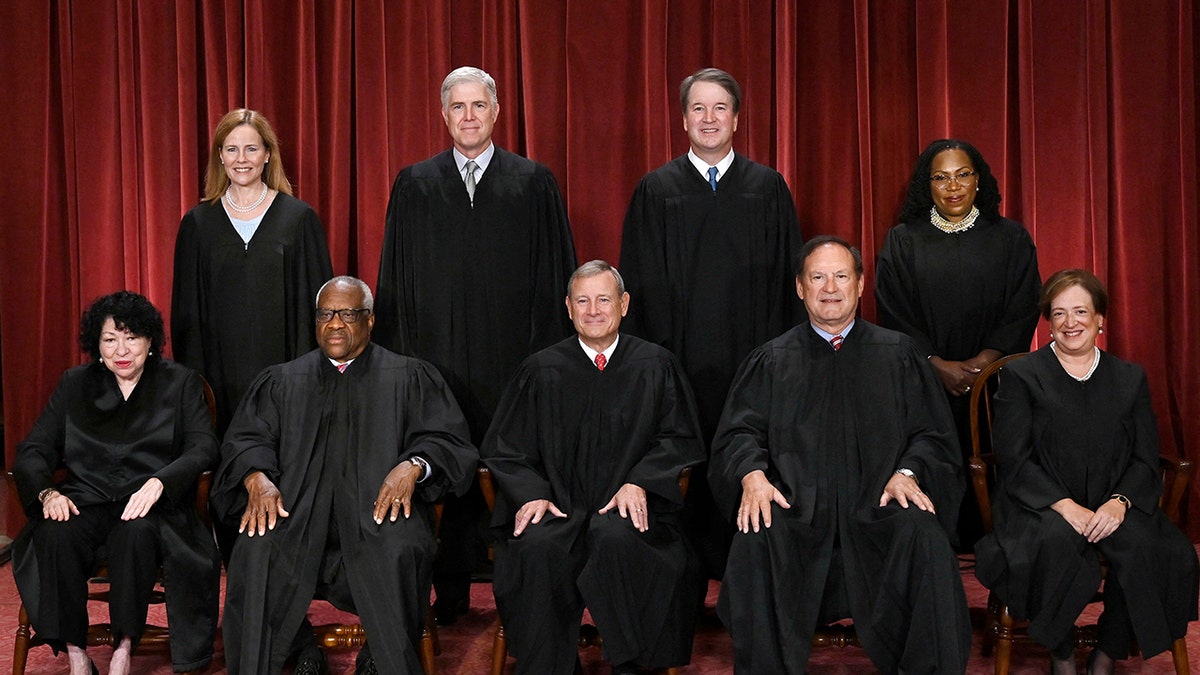
Justices of the U.S. Supreme Court (OLIVIER DOULIERY/AFP via Getty Images)
But Alito said EMTALA is unclear about weighing the dual interests of the woman and the fetus. He noted the law specifically references the "unborn child."
"Isn’t that an odd phrase to put in a statute that imposes a mandate to perform abortions."
Alito also pressed the Justice Department lawyer on whether federal law also requires abortions for mental health reasons, not just to protect a woman’s physical health.
Speaking for the federal government, Prelogar conceded mental health can never be the basis for an abortion.
CLICK HERE TO GET THE FOX NEWS APP
Chief Justice John Roberts asked whether EMTALA requires doctors morally opposed to abortion to perform one, and who would decide whether a broader refusal to treat would lead to sanctions.
"What happens if a dispute arises with whether or not the doctor was within the confines of Idaho law?" he asked. "It’s an obvious concern."
The consolidated cases are Moyle v. U.S. and Idaho v. U.S. A ruling is expected in late June.




